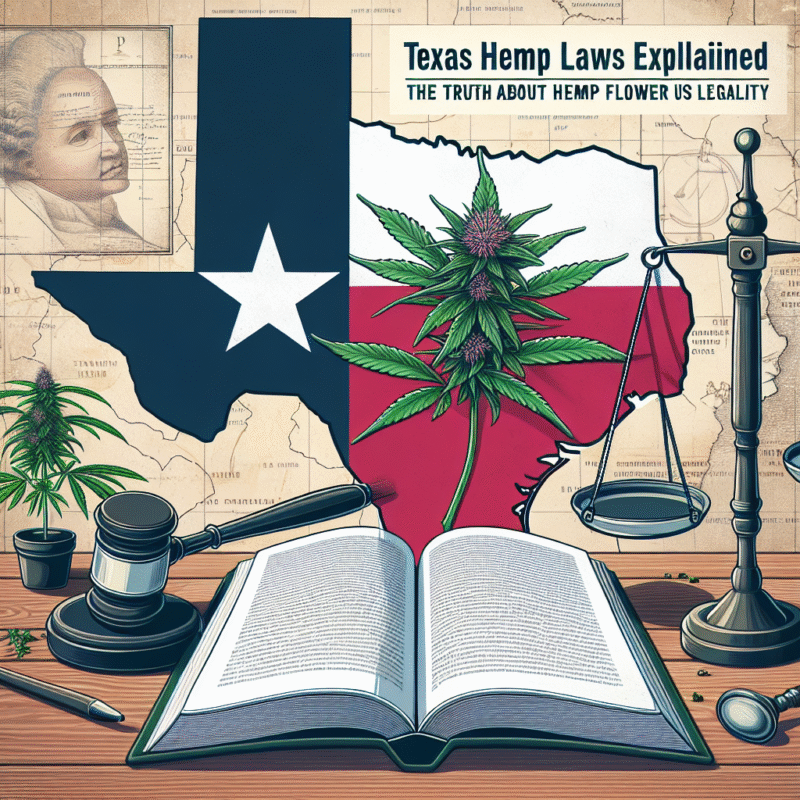Texas Hemp Laws Explained: The Truth About Hemp Flower Legality
The landscape of cannabis law in the United States has evolved rapidly in recent years, and Texas is no exception. With the 2018 Farm Bill legalizing hemp at the federal level, states began shaping their own regulations. Texas has made significant strides, but understanding the nuances of hemp flower legality can be complex. This article breaks down Texas hemp laws, focusing on what you need to know about hemp flower.
What is Hemp?
Hemp refers to cannabis plants with a THC concentration of 0.3% or less. This distinction is crucial since it differentiates hemp from marijuana, which has higher THC levels and remains illegal under federal law in many states. Hemp is used in various products, including textiles, construction materials, food, and health supplements.
The 2018 Farm Bill
The landmark 2018 Farm Bill legalized hemp cultivation and production across the United States, allowing states to create their own regulatory frameworks. In response, Texas passed Senate Bill 1325 in 2019, formally legalizing hemp production and setting the stage for a new industry.
Key Provisions of Senate Bill 1325
-
Legal Definition of Hemp: The bill adopted the federal definition of hemp, allowing for the cultivation and sale of cannabis with a THC content of 0.3% or lower.
-
Licensing Requirements: Anyone wishing to grow or process hemp must obtain a license from the Texas Department of Agriculture (TDA). This includes submitting an application, paying fees, and following regulatory guidelines.
- Testing Protocols: Hemp crops must be tested for THC levels during the growing cycle. If levels exceed 0.3%, the crop must be disposed of, which poses risks for farmers.
The Legality of Hemp Flower
Is Hemp Flower Legal in Texas?
Yes, hemp flower is legal in Texas, but there are caveats. The TDA oversees the cultivation and sale of hemp, including hemp flower. Retailers can sell hemp flower products, including pre-rolls and raw buds, as long as they adhere to the THC limit.
Retail Availability
Hemp flower can be found in various retailers throughout Texas, including specialized hemp shops, online marketplaces, and some convenience stores. It’s essential for consumers to ensure they are purchasing products from reputable sources that provide third-party lab testing to confirm THC levels and purity.
Restrictions and Considerations
While hemp flower is legal, there are important considerations and restrictions:
-
Product Labels: Hemp flower products must be labeled correctly and disclose THC content. Misleading packaging could lead to legal repercussions for retailers.
-
Local Ordinances: Some cities and counties in Texas may have their own regulations regarding the sale and use of hemp products. It’s advisable for consumers and businesses to check local laws.
-
Transportation and Use: While transportation of hemp flower across state lines is generally allowed, individuals should be cautious when crossing into states with stricter cannabis laws.
- Usage Laws: Though hemp flower is legal, its recreational use is still a gray area. While it is not prohibited, consuming hemp flower in public spaces may be frowned upon or subject to local ordinances.
Legal Concerns and Future Developments
Despite the legalization of hemp flower, ambiguities remain in the legal framework. Law enforcement may still exercise caution, especially regarding the differentiation between hemp and marijuana. Developing public understanding and acceptance of hemp products will be crucial for the industry’s growth.
Future Legislation: As the industry matures, further legislative developments are anticipated. Advocates are pushing for clarification on several aspects of hemp laws, including product testing requirements and the establishment of clearer guidelines for consumers and businesses alike.
Conclusion
Texas hemp laws reflect a changing landscape in cannabis regulations, offering opportunities for growers, retailers, and consumers. Hemp flower is legal, but stakeholders must navigate a complex web of regulations and public perceptions. As the industry evolves, staying informed is paramount for anyone involved in the Texas hemp market. Whether you’re a farmer, a retailer, or a consumer, understanding these laws will help you engage responsibly in this burgeoning sector.

